Ongoing Studies
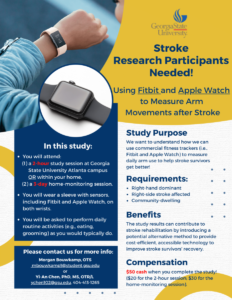 Join our study examining the practicality of using everyday wearable sensors like Fitbit and Apple Watch to monitor arm and hand movements in stroke survivors’ daily lives.
Join our study examining the practicality of using everyday wearable sensors like Fitbit and Apple Watch to monitor arm and hand movements in stroke survivors’ daily lives.
We’re aiming to understand how these commonly available devices can track and provide valuable insights into the arm and hand usage patterns of stroke survivors outside clinical settings. Your participation can contribute to advancing our understanding of these technologies’ usefulness in real-world scenarios.
Volunteers will incorporate these wearable sensors into their daily routines, allowing us to gather data on their arm and hand behaviors. Your involvement could lead to improved ways of monitoring and enhancing rehabilitation progress for stroke survivors.
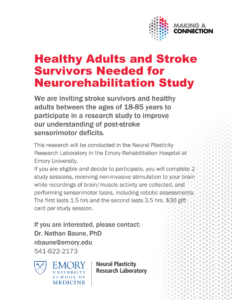 This study investigates how the brain adapts after a stroke, focusing on changes in sensory processing. If you or someone you know has experienced a stroke, participation in this research is welcome!
This study investigates how the brain adapts after a stroke, focusing on changes in sensory processing. If you or someone you know has experienced a stroke, participation in this research is welcome!
Using EEG (electroencephalography), we aim to understand how stroke impacts sensory information processing, particularly in spatial awareness and movement perception (proprioception).
Volunteering involves a safe and straightforward process. Participants visit our team for the placement of scalp sensors to measure brain activity. This procedure is painless and does not involve medication or radiation. Your contribution is crucial in developing potential therapies for stroke survivors.
Join us in uncovering how the brain recovers after stroke and adapts to sensory changes. Your involvement could lead to improved rehabilitation methods. Enroll now and contribute to this significant study!
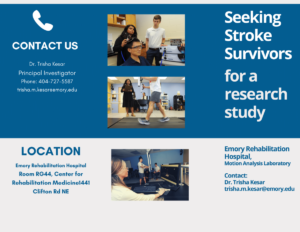 Be part of our exciting FastFES R01 clinical trial! We’re comparing the impacts of Fast and FastFES gait training on various outcomes, including neural, biomechanical, and clinical measures.
Be part of our exciting FastFES R01 clinical trial! We’re comparing the impacts of Fast and FastFES gait training on various outcomes, including neural, biomechanical, and clinical measures.
This study aims to understand how different training methods affect walking ability and overall outcomes. If you’re interested in contributing to cutting-edge research that could shape future rehabilitation approaches, consider participating!
Volunteers will participate in gait training sessions and assessments to measure changes in neural responses, body mechanics, and overall clinical progress. Your involvement could pave the way for more effective gait training strategies for individuals seeking to improve their mobility post-injury or impairment.
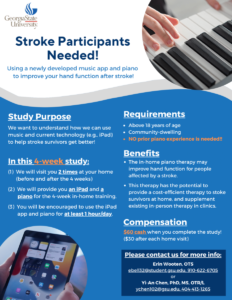 Join us in exploring the practicality of an innovative app designed for stroke recovery through music-based training.
Join us in exploring the practicality of an innovative app designed for stroke recovery through music-based training.
This study focuses on evaluating the feasibility of a new app prototype tailored for individuals recovering from strokes. Your participation will help us understand how effective and user-friendly this app is for stroke survivors.
Volunteers will have the opportunity to interact with the app and provide valuable feedback on its usability and impact. Your insights could significantly contribute to refining this app, potentially making it a valuable tool in stroke rehabilitation.
 Join our study examining the practicality of using everyday wearable sensors like Fitbit and Apple Watch to monitor arm and hand movements in stroke survivors’ daily lives.
Join our study examining the practicality of using everyday wearable sensors like Fitbit and Apple Watch to monitor arm and hand movements in stroke survivors’ daily lives.
We’re aiming to understand how these commonly available devices can track and provide valuable insights into the arm and hand usage patterns of stroke survivors outside clinical settings. Your participation can contribute to advancing our understanding of these technologies’ usefulness in real-world scenarios.
Volunteers will incorporate these wearable sensors into their daily routines, allowing us to gather data on their arm and hand behaviors. Your involvement could lead to improved ways of monitoring and enhancing rehabilitation progress for stroke survivors.
 This study investigates how the brain adapts after a stroke, focusing on changes in sensory processing. If you or someone you know has experienced a stroke, participation in this research is welcome!
This study investigates how the brain adapts after a stroke, focusing on changes in sensory processing. If you or someone you know has experienced a stroke, participation in this research is welcome!
Using EEG (electroencephalography), we aim to understand how stroke impacts sensory information processing, particularly in spatial awareness and movement perception (proprioception).
Volunteering involves a safe and straightforward process. Participants visit our team for the placement of scalp sensors to measure brain activity. This procedure is painless and does not involve medication or radiation. Your contribution is crucial in developing potential therapies for stroke survivors.
Join us in uncovering how the brain recovers after stroke and adapts to sensory changes. Your involvement could lead to improved rehabilitation methods. Enroll now and contribute to this significant study!
 Be part of our exciting FastFES R01 clinical trial! We’re comparing the impacts of Fast and FastFES gait training on various outcomes, including neural, biomechanical, and clinical measures.
Be part of our exciting FastFES R01 clinical trial! We’re comparing the impacts of Fast and FastFES gait training on various outcomes, including neural, biomechanical, and clinical measures.
This study aims to understand how different training methods affect walking ability and overall outcomes. If you’re interested in contributing to cutting-edge research that could shape future rehabilitation approaches, consider participating!
Volunteers will participate in gait training sessions and assessments to measure changes in neural responses, body mechanics, and overall clinical progress. Your involvement could pave the way for more effective gait training strategies for individuals seeking to improve their mobility post-injury or impairment.
 Join us in exploring the practicality of an innovative app designed for stroke recovery through music-based training.
Join us in exploring the practicality of an innovative app designed for stroke recovery through music-based training.
This study focuses on evaluating the feasibility of a new app prototype tailored for individuals recovering from strokes. Your participation will help us understand how effective and user-friendly this app is for stroke survivors.
Volunteers will have the opportunity to interact with the app and provide valuable feedback on its usability and impact. Your insights could significantly contribute to refining this app, potentially making it a valuable tool in stroke rehabilitation.
Past Studies
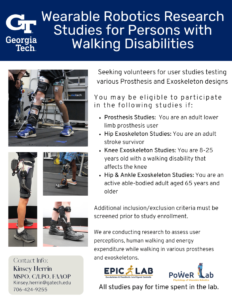 Be part of our research investigating the use of a cutting-edge powered hip exoskeleton designed to aid stroke survivors experiencing gait impairments.
Be part of our research investigating the use of a cutting-edge powered hip exoskeleton designed to aid stroke survivors experiencing gait impairments.
This study aims to explore the effectiveness and potential benefits of this innovative technology in assisting stroke survivors with walking difficulties. Your participation will help us understand how this powered hip exoskeleton can positively impact mobility and gait.
Volunteers will have the opportunity to use the hip exoskeleton under supervision, allowing us to gather insights into its usability and impact on walking ability. Your involvement could contribute to advancements in assistive devices for stroke survivors.
 Be part of our research investigating the use of a cutting-edge powered hip exoskeleton designed to aid stroke survivors experiencing gait impairments.
Be part of our research investigating the use of a cutting-edge powered hip exoskeleton designed to aid stroke survivors experiencing gait impairments.
This study aims to explore the effectiveness and potential benefits of this innovative technology in assisting stroke survivors with walking difficulties. Your participation will help us understand how this powered hip exoskeleton can positively impact mobility and gait.
Volunteers will have the opportunity to use the hip exoskeleton under supervision, allowing us to gather insights into its usability and impact on walking ability. Your involvement could contribute to advancements in assistive devices for stroke survivors.
